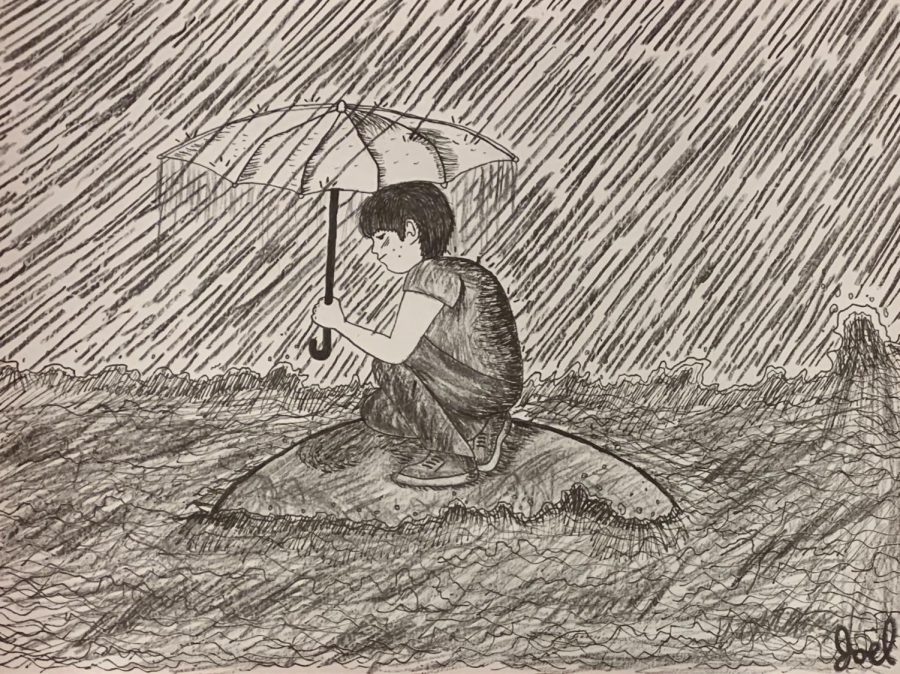The effects of isolation during a pandemic
Photo by Joel Bierbower
A representation of what it feels to be isolated.
Many people feel lonely or isolated, almost like they’re cut off from the rest of the world. They wonder if things are ever going to get better as the days go by, and each one is similar to the last. They learn to overcome these feelings and adjust while others continue to feel sad and depressed. It’s not easy.
In the midst of the recent COVID-19 pandemic, people sought refuge and quarantine in their homes, which resulted in isolation from friends and family members. Although they could still connect via the internet, it just wasn’t the same as seeing them face to face. While this pandemic has had a major emotional impact on everyone, it has especially affected teenagers. Their formative years have been altered, and they had to switch to online learning, isolating themselves from everyone.
The teen years are an important part of life because people build up skills that mold them into fully-mature adults. These years should be a relatively carefree time with memories of peers, teachers, and activities, as well as many decisions that will impact the future. Instead, middle schoolers transitioned to ninth grade with no introduction, and high schoolers missed out on the last quarter of activities such as concerts, prom, spring sports, plays, honors, and banquets. Many seniors never had a proper graduation. The 2019-2020 school year was a quarter frozen in time, and then eventually lost in time, as the pandemic continues, now seven months and counting.
Because of this long term situation, many students have unfortunately fallen into depression. According to an article on EPHA.org regarding the effects of isolation, “Anxiety and apathy, as well as loneliness, are some of the mental health consequences that will persist long after the pandemic ends, while the increased feelings of depression and stress, especially during a time of uncertainty, may have serious impacts on public health, increasing people’s vulnerability to poor health, and weakening society as a whole.”
As the new school year began this fall, many students faced uncertainty. While some schools opted for in-person learning only, others created an alternating schedule composed of A/B groups. With this new schedule came an increase in loneliness and isolation, especially for those students who chose full-time remote learning. Within the first week back at Lincoln East, the number of students visiting their counselors tripled. However, that is only just the beginning, as no one knows the long term effects on our mental health.
Former East High student and Oracle photographer Michael Frandolig shared his feelings about the pandemic and missed opportunities.
“I really loved my high school experience, but the only thing that I will always wonder ‘what if’ is prom and my senior track season. What if my team won state?” Frandolig said. “I also wanted to shake the hands of the teachers who helped form me into the man I am today. I can’t thank them enough.”
While many seniors lost their happy endings, other students lost the opportunity to participate in spring sports like track and soccer. The shock of the abrupt end to everything was multiplied with the uncertainty of when “normal” routine would return. East basketball and soccer team member and senior Olivia Kugler had this to say:
“For me, it felt like reality became distant the day after girls state basketball. After the championship, we celebrated like there was no tomorrow. Turns out there would be no regular tomorrow. It all changed so quickly, and little did I know that it would affect spring seasons.”
Aside from sports, many extracurricular activities were cancelled as well. Students involved in music missed their final concerts, students involved in theatre and drama didn’t get to perform, and all of the hard work and planning that went into prom and post-prom were all for nothing. Before classes went remote in March, sophomore Lily Okelberry was preparing for her role as student director of the school‘s one-act play The Trial of Goldilocks. Sadly, her big break was cut short when the show was cancelled.
“When we started remote learning last year, a lot of the curriculum for my classes got cut off, and I didn’t get a conclusion to a lot of my courses,” Okelberry said.
Lily added regarding isolation, “I’ll definitely have weeks that are worse than others, I normally feel more down when I think about what life would be like without COVID. As theatre started back up, I’ve been able to interact with a lot of people (safely) while doing tech work. However, without school, I probably wouldn’t be interacting with anyone outside of my household.”
Overall, the pandemic has resulted in less social interaction, and the acceptance of the “new normal” is beginning to spread like a virus itself. I personally have many questions about how this will affect our world. Has isolation become the new norm? Will post-COVID-19 society be comparable to post-9/11 in terms of behavior and worldview? Will social distancing and hand sanitizer be expected even after the pandemic is over?
Over the past few months, we have all lived through many changes. After the initial shock, and the acceptance of new rules, we have learned to move forward. The importance of mental health and staying connected should be the focus, in order to get through this together and come out stronger in the end.

My name is Joel Bierbower and I’m a senior. I am involved in a variety of activities such as Show Choir, Singers, Theater, Ambassadors, Tri-M, and the...


